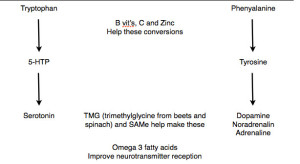What we eat impacts upon our emotional state:
A full detailed account of all nutrients and their effect on health, the brain and as a consequence our mood is beyond the scope of this page. However it does require a mention because what we eat directly impacts how we feel.
The chemicals that the brain produces require certain nutrients for their manufacture.
While the chemicals (neurotransmitters, hormones) the brain is influenced to produce is prompted by a thought, unless it has the nutritional building blocks (vitamins, minerals, fats, amino acids) to make the chemical it cannot follow through on the prompt.
Loving thoughts prompt the production of dopamine – a ‘happy’ chemical – and fearful thoughts prompt the production of ‘adrenaline’ – a stress hormone – only when phenalyaline (amino acid), C, B vitamins and zinc etc are available in the body.
You could train yourself to think very well and positively, yet if the body lacks what’s required to produce the ‘happy’ chemicals, you won’t feel much better.
You can think very calming thoughts, but if adrenaline has been stimulated by copious shots of espresso the body is likely to feel jittery regardless.
You can be perceiving lovingly yet if you’re pre-diabetic or hyperglycemic and in a low blood sugar response to a sugar binge your mood will be low, tired and fearful.
Having a good diet and at least some regular moderate exercise as part of your lifestyle oils the wheels for good cognition to pay the highest dividends.
It is beneficial to get blood readings once a year to determine if your nutrition is sufficient for your needs. Iron, calcium, B12, B3, Vit C, Vit D (especially if you come from colder climates) deficiencies – which are common – effect energy levels, mood and overall health. Supplementing when required is advised.
Food and Mood
Mood disorders are common. These represent a category of mental disorders in which the underlying problem primarily affects a person’s persistent emotional state.
We can do things with diet that can minimize and treat symptoms of low or anxious mood.
Food affects Mood
The main nutritional influences on mood disorders include the following:
1) Blood Sugar imbalances.
2) Lack of amino acids – these are the building blocks in protein. Trytophan, phenylanlanie and tyrosine are amino acids that are precursor nutrients required in the manufacture of the neurotransmitters serotonin, dopamine and noradrenalin. These neurotransmitters are responsible for how well, balanced and good we feel.
3) Inadequate B vitamins – especially B6, niacin (B3), folate and B12, choline and magnesium (as these are involved in sugar and alcohol metabolism and are also required in the regulation of neurotransmitters).
4) Lack of essential fatty acids, namely the Omega 3’s (DHA and EPA). Also an imbalance in the ratio of omega 6 : omega 3 – too high Omega 6 leads to problems in health and brain functioning. The brain required omega 3’s to work well and is 40% made of the omega 3 DHA.
Blood sugar imbalances
Symptoms of impaired blood sugar control include
By changing what we eat and by being mindful of the effect of refined carbohydrates that result in blood sugar spikes we can impact how we feel. Eating whole unprocessed fiber rich foods we can ensure to have reasonable blood sugar levels throughout the day.
Nutrients like the B vitamins are required to metabolize sugar, so the more sugar that’s consumed the more likely it is that the B vitamins are depleted and therefore the B vit’s aren’t available to regulate the neurotransmitters and that affects how we feel.
Symptoms of B vitamin deficiency:
Best sources of B vitamins:
The way to normalize blood sugar:
1) Limit refined carbohydrates (confectionary, manufactured cereal, refined grains, white potatoes, soda, soft drinks)
2) Eat whole foods low in natural sugar and high in fiber (all kinds of fruit and vegetables except starchy potatoes)
3) Eat regular meals with some protein and healthy fat (if vegetarian include some nuts and seeds)
4) Be physically active – this builds and preserves muscle mass and helps to reduce fat mass which is insulin resistant
Note on artificial sweeteners:
It’s better to wean off sugar and to let the taste buds adapt to lesser amounts than it is to replace sugar with sweeteners.
Amino Acids – Protein

Mood changes affected by imbalance in neurotransmitters
Magnesium Mg and depression
Omega 3 fatty acids
Omega 3’s influence serotonin status
Omega 3 and anxiety
Omega 6 is pro inflammatory and come from refined oils, food made from corn and animals fed corn meal, cottonseed, soy, safflower and sunflower oil. These are in most confectionary and processed foods.
Omega 3 is anti inflammatory and come from fish, seafood, grass fed and grass finished beef, flax seed, chia seeds.
The ratio of omega 6 to omega 3 is important and recommended to be around 4:1. Currently with most western diets the ratio is around 17:1. The tendency is to take a fish oil supplement to get the ratio into a healthy range, however it’s better to be aware of where the pro-inflammatory omega 6’s come from and reduce those in the diet.
Need 9 times more plant omega 3 (e.g Flax seed, flax meal and chia seed) to equal marine omega 3 (EPA & DHA).
Bottom line: